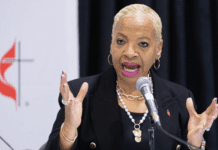“It is appropriate that institutions such as the World Trade Organization and the World Intellectual Property Organization adapt their legal instruments lest monopolistic rules constitute further obstacles to production and to an organized and consistent access to health care on a global level,” he said.
Francis delivered the speech to a much smaller group of diplomats than usual, and skipped the part of the audience that ambassadors relish: a chance to greet him personally and exchange a few words. The restrictions were clearly a response to the exponential rise in coronavirus cases in Italy.
On other topics, Francis lamented Syria’s devastation, calling for “political and constitutional reforms” so the country can be “reborn,” and urged that any sanctions avoid targeting civilians. He didn’t single Russia out by name but called for “acceptable and lasting solutions” for Ukraine and the southern Caucasus inspired by “reciprocal trust and readiness to engage in calm discussion.”
And he also urged more open communications to avoid culture wars, without mentioning gender ideology or other hot-button topics by name.
“(Some attitudes) leave no room for freedom of expression and are now taking the form of the ‘cancel culture’ invading many circles and public institutions. Under the guise of defending diversity, it ends up cancelling all sense of identity, with the risk of silencing positions,” he warned.
This article originally appeared here.











